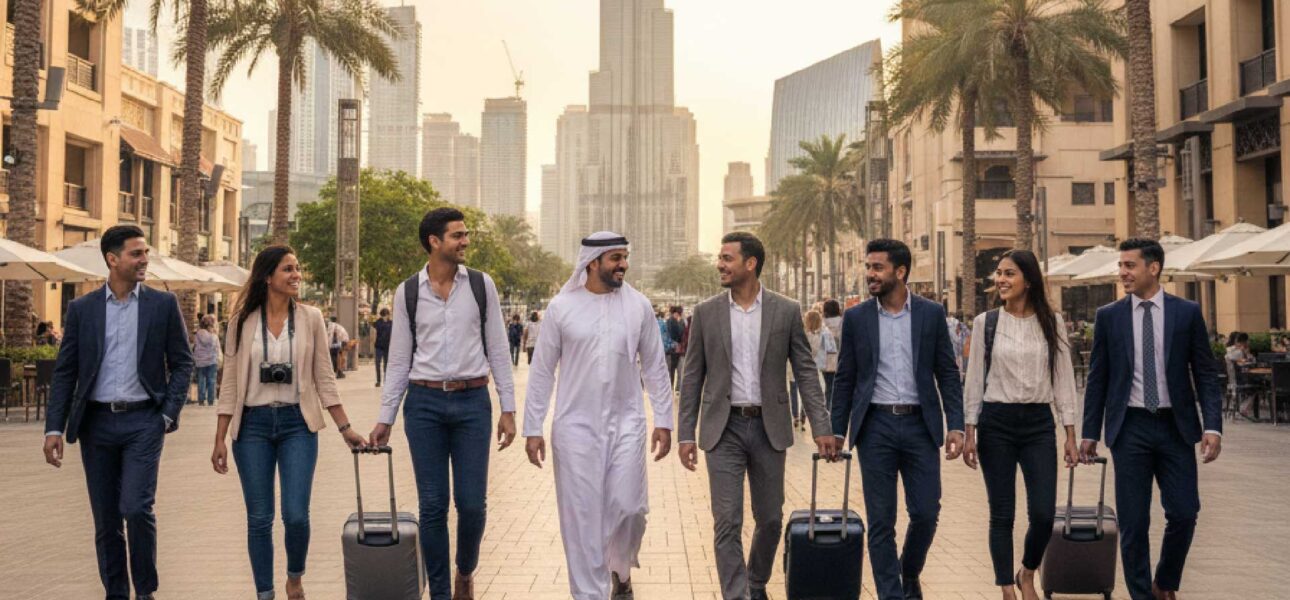Dubai is not only famous for its skyscrapers and luxury shopping but also for its incredible cultural diversity. With more than 200 nationalities living and working here, the city has become a melting pot of languages. From business meetings to market stalls, Dubai’s streets echo with a fascinating blend of voices that truly reflect its international spirit. Let’s explore the most spoken languages in Dubai and how they shape everyday life.
Official Language of Dubai: Arabic
The official language of Dubai, as well as the UAE, is Arabic. It is the language used in government offices, legal documents, laws, and official communication. Road signs, contracts, and public notices are usually written in both Arabic and English, making navigation easier for everyone.
Most Emiratis speak Gulf Arabic, a local dialect, in their daily lives, while Modern Standard Arabic is used in education, media, and formal settings. Tourists don’t need to know Arabic to get around, but learning simple greetings like Marhaba (hello), Shukran (thank you), or Ma’a as-salama (goodbye) can go a long way in showing respect.
The Role of English in Dubai
Even though Arabic is the official language, English is the most spoken language in Dubai. It is the common language of business, education, and tourism. Almost all road signs, menus, advertisements, and contracts are available in English, making it easy for expats and visitors to communicate.
In offices, meetings, and schools, English dominates daily communication. Tourists will also find that hotels, restaurants, and shops primarily use English. In short, English acts as a unifying language that connects people of all nationalities in Dubai.
Expat Influence: Other Popular Languages in Dubai
Since almost 85% of Dubai’s population consists of expatriates, many other languages are widely spoken across the city. Some of the most common include:
Hindi & Urdu – Spoken by South Asian workers, traders, and their families.
Tagalog – Widely used in hospitality and customer service, thanks to the Filipino community.
Persian (Farsi) – Common within the long-established Iranian community.
South Indian Languages (Malayalam, Tamil, Telugu ) – Popular in Indian-owned businesses and neighbourhoods.
Punjabi & Bengali – Spoken by communities from Pakistan, India, and Bangladesh.
European Languages (French, German, Russian) – Heard among expatriates, tourists, and in luxury markets.
This mix makes Dubai one of the most linguistically diverse cities in the world—you can hear a dozen different languages just by walking down the street.
Where You’ll Hear These Languages in Dubai
Dubai’s multilingual nature can be seen everywhere:
Government offices – Arabic (with English translations).
business & corporates – English is the main language in contracts and meetings.
Education – English is the primary medium of instruction, while Arabic is taught as a compulsory subject.
Markets, taxis, neighbourhoods – Hindi, Urdu, Malayalam, and Tagalog are common.
tourist hotspots – English is dominant, but you’ll also hear Arabic, Tagalog, Hindi, and Russian.
This ability to switch languages depending on the setting highlights how Dubai balances its local culture with global influence.
Benefits of Learning Arabic in Dubai
While English is enough to live, work, or travel in Dubai, learning Arabic offers many advantages:
Build stronger connections with Emiratis.
Gain deeper cultural understanding.
Enjoy a business advantage when dealing with government offices.
Travel more easily across the Middle East.
Personal growth by learning one of the world’s richest languages.
Even a few Arabic words can help you feel more connected to the city.
Tips for Visitors on Language in Dubai
If you are visiting Dubai, here are some quick tips:
Rely on English – You’ll find it everywhere in hotels, malls, and restaurants.
Learn basic Arabic phrases – A simple Shukran or Marhaba adds warmth to conversations.
Be patient with accents – With so many languages, English comes in different forms.
Use translation apps – Handy in local markets where Hindi, Urdu, or Tagalog might be common.
Respect cultural expressions – Words like Inshallah carry deep meaning, so use them wisely.
Conclusion: A City of Global Conversations
Dubai is more than a city of luxury it is a city of people and cultures. While Arabic is the official language of Dubai, English is the most spoken language, serving as the bridge between over 200 nationalities. Add in Hindi, Urdu, Tagalog, Farsi, and many others, and you get a city buzzing with global conversations.
Whether you’re a tourist, expat, or investor, knowing a few words of Arabic—or simply appreciating the blend of languages—can make you feel right at home in this cosmopolitan hub.


